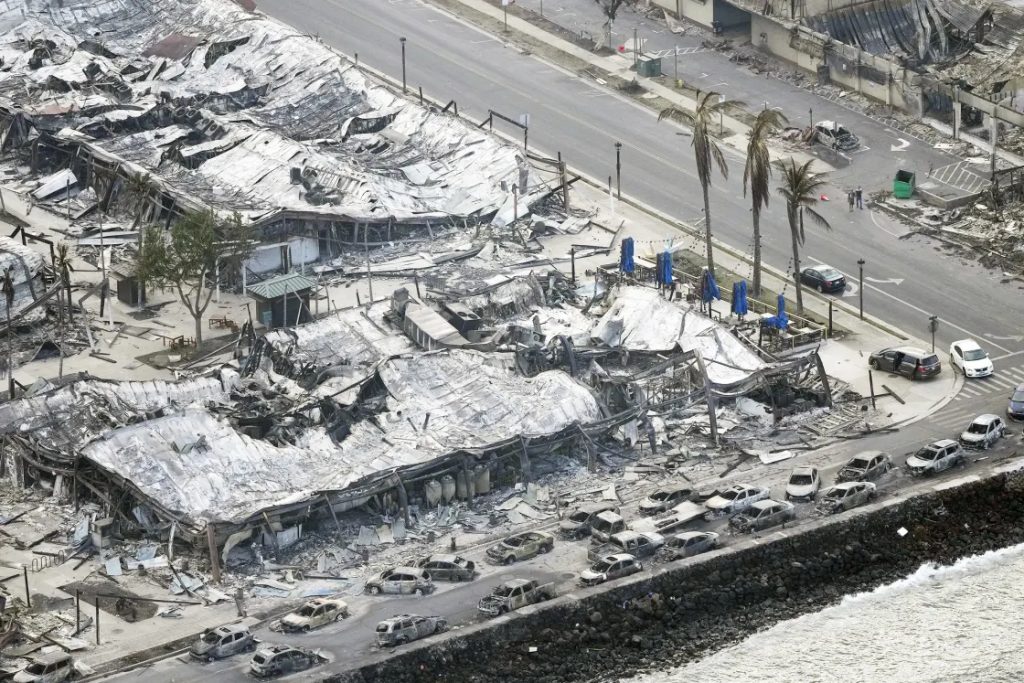It has been a difficult summer for people directly impacted by the climate crisis, of course, but also for those of us who have been spared the fires, floods, and extreme heat yet are nevertheless terrified by what’s happening. Some of the headlines have been particularly shocking, such as when the water off the coast of Florida reached hot tub levels of heat; or the news that Antarctic sea ice levels are covering “nearly a million square miles less than the expected average from…40 years of satellite observations”; or that, last month, the average temperature in Phoenix, Arizona was over 100 degrees.
And yet some climate events astonish for how personal they are, something I experienced first-hand yesterday when I read that much of the historic city of Lahaina, on the island of Maui, Hawaii, burned to the ground in a wildfire fueled by climate change-driven drought. As of this writing, 53 are dead, with the count expected to rise; the fire was so intense and fast-moving that to save themselves, people had to flee to the ocean.

The news was personal for two reasons. First, growing up, my parents and I would go to Maui nearly every Spring break, usually staying in or near Lahaina. I have so many fond memories of those trips, the lovely little town and beautiful beaches, water, and people, it is as though a part of my child, something idyllic and wonderful that I could still visit, were destroyed. And second, my parents got back from a trip to Maui just a week ago: given the number of casualties, it’s possible that had they been on the island at the time of the fire, they would’ve been injured, or worse.
The idea of a deadly, raging wildfire on a lush tropical island in the middle of the Pacific is hard to fathom. But we have entered what Stephen J. Pyne has dubbed the Pyrocene–the Age of Fire–and nowhere on Earth is safe from the impacts of the climate crisis. Not New York City, which in June had the worst air quality of any major city in the world. Not Uruguay, which, despite being lauded for its environmental stewardship and proud of its “bountiful fresh water,” is actually facing a water crisis, with its capital, Montevideo, “almost completely dry, forcing the city to add brackish water to its supplies.” Not Iran, where the government recently “announced a two-day public holiday…amid soaring temperatures that threatened public health and strained the power grid.” And not Europe, where extreme weather is causing loss of life, harming tourism and agriculture, impacting the production of nuclear and hydropower, and rendering ancient waterways unnavigable.
There is good news, to be sure, namely the falling costs of clean energy, the increasing adoption of electric vehicles, and the implementation of policies like the U.S. Inflation Reduction Act and similar legislation in Europe and elsewhere. But it’s hard to ignore the fact that emissions are still rising, the pace at which clean energy is being installed is way too slow, and the imperative to treat the moment as an existential emergency is not shared by enough stakeholders–especially elected officials, investors, and big business.
I have no more patience or respect for people who hem and haw while the world burns, be they environmentalists who oppose wind farms; banks that, on the one hand, talk about “net zero” emissions goals and, on the other, invest billions into fossil fuel projects; individual investors that want to “change the world”–so long as their money isn’t at risk and they don’t have to sacrifice returns; people of means who could easily afford to invest in clean energy but don’t. For all our dominance of the planet, human civilization is so very fragile. In the best of times we are beset by war and conflict. How we respond to a time of seemingly endless crisis will determine the kind of world my son inherits. In my next essay, I will talk about the opportunity we have to exit the era of consumption and enter the era of building, not monuments or stadiums, but resilient infrastructure, clean energy, restored wetlands, carbon sequestration facilities, sustainable and healthy affordable housing. What these efforts have in common is that they require cooperation and community, help us adapt to and ameliorate climate change, and advance human flourishing and the integrity of the natural world.
In the meantime, I wanted to share a poem I wrote about the fires, called Lahaina. For in truth, in times like this poetry and art may be the best way to process the unbearable.




Leave A Reply